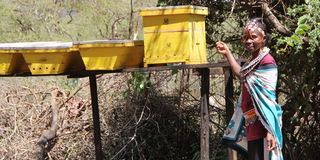The cultural village giving Maasai women a fresh lease of life

Ms Eunice Kaparo, a member of Twala Cultural Centre in Laikipia at her apiary. Each of the group members owns a beehive at home apart from the ones jointly owned.
What you need to know:
- Twala Cultural Village entails a walk to a baboon territory, guest houses, conference facilities and beadworks by Maa women.
- Activities earns the 203 women millions of shillings annually, 10 per cent is channelled towards supporting girls’ education.
- The cultural centre also0 educates members to discard harmful traditions and promote rich cultural heritage.
In the parched terrain of Laikipia plateau stands a unique economic empowerment project run and managed by women.
At Twala Cultural Village, located near Il Polei Shopping Centre along the Nanyuki-Dol Dol Road, the Maasai women attend to beehives, manage a greenhouse and cultivate aloe vera plants for export markets, all preoccupations alien to this pastoral community.
The eco-tourism project comprises a walk to a baboon territory, guest houses (eco-tourism manyattas), conference facilities and beadworks. Sitting on a 40-acre piece of land donated by two community group ranches, the various income generating activities at this decade old establishment, have earned millions of shillings annually, money that is shared among the members in form of dividends.
“We hold meetings twice a year where a financial report is presented to the members. From the profit, we give out 70 per cent as dividend to members, 20 per cent is ploughed on infrastructural development, while 10 per cent is channelled towards supporting girls’ education,” explains Rosemary Nenini, the manager of the cultural village.
Half year profit
During the last Annual General Meeting, half year profit was Sh4million and each of the 203 members, all women, pocketed Sh20,000.
In 2020, the group earned more than Sh1million from sale of honey, from the 120 beehives that dot the compound.
This project has made strides towards elimination of sexual and gender-based violence (SGBV). It has reversed women’s traditional roles in the society, uplifting their social standing in the family by according them an opportunity to be equal providers in their respective homesteads.
“Adverse effects of climate change have driven us into diversification and embodied us to fight gender-based violence. Recurrent droughts and death of livestock, our traditional source of livelihood, only fuel conflicts in the family,” notes Ms Nenini.
The manager, who is also a founding member, points that cases of women battering among the pastoralists rises during drought, with husbands venting their frustrations on their spouses after failing to fulfil their traditional duties-that of providing for the family needs.
She says drought contributes in SGBV in two folds - physical assaults on spouses and Female Genital Mutilation (FGM) perceived as a traditional gateway to marriage for girls.
Once rains set in after prolonged droughts, men have a tendency of marrying off their daughters to get bride price in form of livestock, as a way of restocking the herd after drought.

Twala Cultural Centre founder and manager Rosemary Nenini inside a greenhouse at the centre located in Laikipia County in Laikipia North Sub-county.
Cases of pupils dropping out of school during drought are common as the semi-nomadic community migrate with their livestock in search of pasture and water.
“By giving financial support towards education, we are able to retain girls in primary boarding schools, minimizing dropouts and possible child marriages. Educating the girls also makes them aware of their rights to say no to harmful cultural practices,” says Ms Nenini.
At a personal level, Ms Nenini is a child rights defender and is occasionally invited to international forums to give talk on “marginalization among indigenous women”.
She says since 2009, she has rescued 14 girls from early marriages and handed them over to the children officers for care and protection.
Besides being an income generating project, the cultural centre is in the forefront of educating the members to discard harmful traditions and promote rich cultural heritage.
“One of the conditions for joining the group is a personal declaration to support girl child education and not allow her to be subjected to such vices as FGM or early marriage. These daughters, some pursuing university education, have become role models in the society.
We love all children but the girl child is disadvantaged, while the boy inherits his father’s property (land and livestock). By supporting the girls to access education, we are moulding future leaders,” explains the manager.
The cultural centre has become a learning centre for the members who now utilise the acquired skills in their respective farms.
“We teach our members organic farming and recycling scarce water for use at kitchen gardens. This has contributed greatly in lowering malnutrition among children, who rely on milk and meat as their main diet,” explains Ms Nenini.
One of the group members Eunice Kaparo, says joining the project has brought massive economic and social benefits to her family.
Five beehives
“I no longer struggle to educate my children or to put food on the table. Previously, we relied on livestock and many times they succumbed to perennial droughts, robbing us of our only source of livelihood,” says Ms Kaparo adding the family recently lost 20 head of cattle to the current drought.
She has replicated some of the group projects at her homestead, located about one kilometre from the cultural village. She has put up a kitchen garden and established an apiary, currently with five beehives.
“Diversification into modern farming has brought peace in our homesteads since we now have an alternative source of income. A time like now, when our animals have succumbed to drought, would be characterized with tension and quarrels in the family,” she says.
Ms Kaparo and her colleagues are reaping big from the group’s slogan: “Without a Maasai woman being economically empowered, nothing will change”. This positive change is being felt beyond the cultural village.





